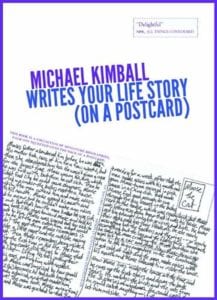
Mud Luscious Presshttp://www.mudlusciouspress.com
From #45 Adam Robinson, who once “hid out all night in a porta potty at an amusement park because some bands he really wanted to see were playing the next day” and later became a poet (Adam Robinson and Other Poems and Say Poem) to #307 Soap, who “was amazed at all the lather it could make,” Michael Kimball condenses life stories to the space of a postcard. In doing so, he gets to the heart of what it means to be alive.
“I never expected strangers to tell me so much about themselves, so many things they have never told anybody else, but I found an unexpected intimacy in the postcard life story project. It tapped into something human and humane. I was continually amazed by what people told me.
I wrote just over three hundred postcard life stories. I wrote one for anybody who wanted one. I didn’t want anybody to feel their life story wasn’t interesting enough. In fact, I found everybody’s life story is interesting if you ask the right questions.”
—Michael Kimball in Michael Kimball Writes Your Life Story (on a postcard)
Shelf Unbound: You’ve condensed to postcard length the life stories
of hundreds of people over the years. What have you discovered about humanity in the process?
Michael Kimball: I was surprised by how earnest most people were and how willing they were to tell me intimate and difficult things about themselves. And I have even more empathy than I did. I see how broken and scared and flawed all of us are. I see how hard almost everybody is trying. It is so difficult to be alive and so wonderful too.
Shelf: You include your own life story in the book. It begins, “Michael Kimball was born two weeks late—in Lansing, MI—during the Great Midwest Blizzard of 1967.” What, to you, is the most significant line in your own story?
Kimball: I just re-read mine and I wasn’t sure what my answer would be until I reached the last line: “There’s something about being where he is, in Baltimore, that makes him feel like he can do anything.” I feel like there’s some great, as-yet-unknown future in that for me.
Shelf: Your novel Big Ray, published last year, begins with the death of your abusive father. Your writing style is, as with your postcards, concise, direct, and unfettered. What have you learned as a novelist from writing the postcard stories?
Kimball: I learned how to condense lots of life and story into one sentence. I learned more and more about picking the right details. I learned to only tell the most important parts. I learned how to maintain a narrative arc without obvious transitions and how to skip 10+ years with a little clause.
Shelf: What do you think it means existentially that our lives can be condensed to a few hundred words on a postcard?
Kimball: This question is probably catching me at a bad time, but I suppose it means that we do exist, at least for a little while, and that we matter, at least a little bit.
